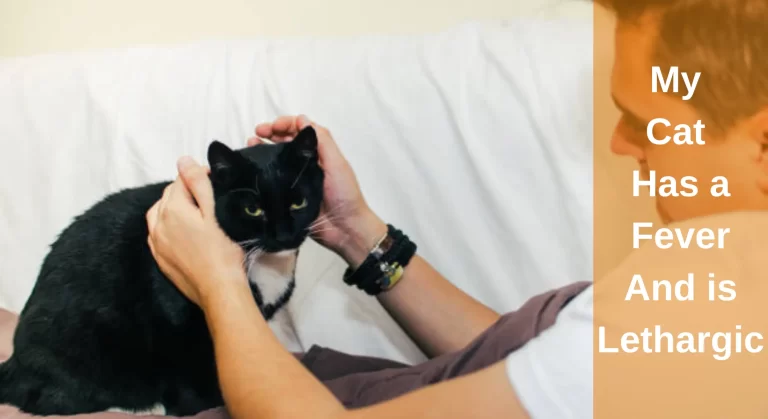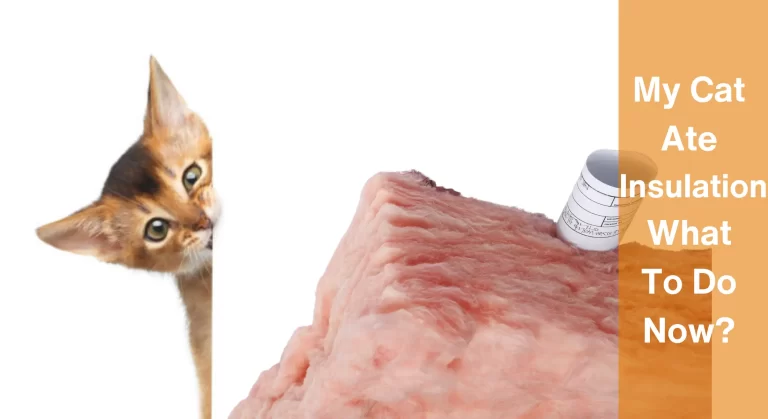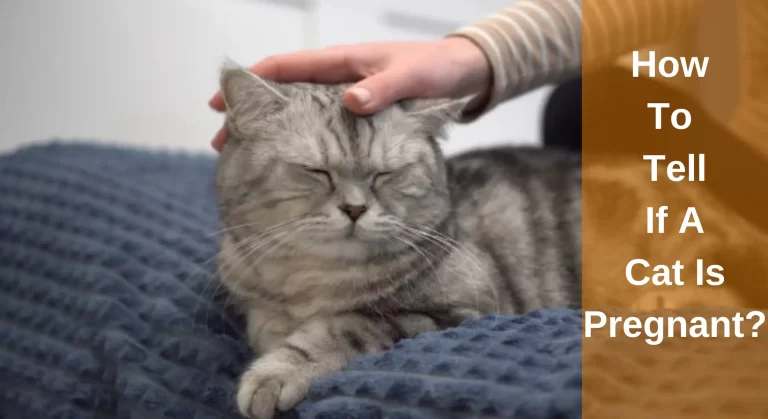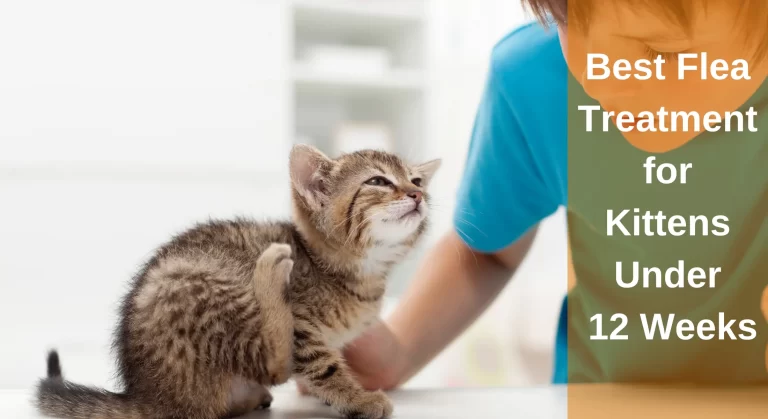Can I Use Human Shampoo on My Cat? [Answered]
Cats are known for being neat creatures who spend around five hours each day grooming themselves, but on occasion, they need extra help. They could have rolled about outside in something unclean or handled anything that might have been dangerous or damaging to them.
Much to their dismay, this tells them that it’s time to wash their cat. You might be concerned, “Can I use human shampoo on my cat?” No, cats’ skin is too acidic for human shampoo, which might cause dryness and discomfort. You should only use cat-specific shampoo because it is the safest and most effective.
Cats that are bathed with human shampoo might have a clean coat, but they will scratch themselves constantly. What should we use instead of human shampoo now that we know it’s not suitable for cats?
When your cat needs a bath, there are several ways you can help. Looking at some alternatives to human shampoo will help you make an informed decision. In this post, you will learn why human shampoo is unsafe for cats and what you can do to bathe your cat safely.
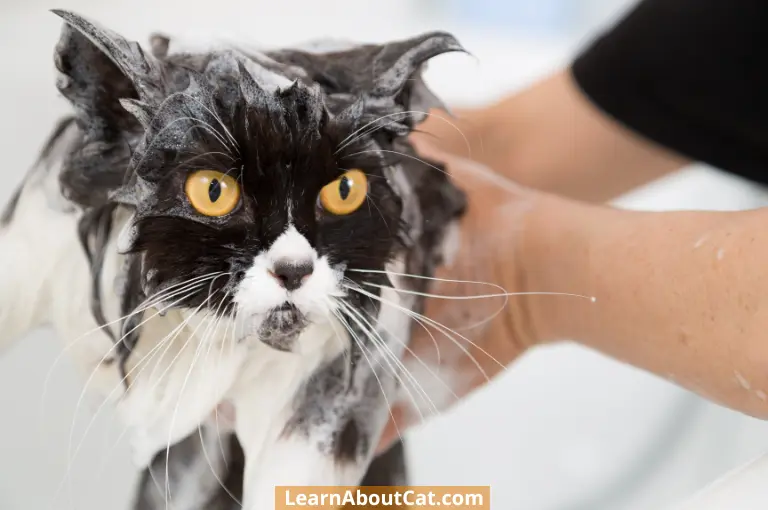
Can You Use Human Shampoo on Cats?
No, you can not use human shampoo on cats; it is specifically designed for humans; you should avoid all costs because they dry out their skin and are unsuitable for cat hair.
The pH balance of cat shampoos is precisely adjusted to clean the cat’s skin and coat while nourishing it.
A major problem with human shampoo is that it can contain ingredients that cause skin irritation and dandruff on the scalp. They often contain essential oils, some of which can be toxic to cats. The presence of these materials can cause dryness even if they aren’t toxic.
Is Human Shampoo Safe for Cats?
No, human shampoo is unsafe and should never be used on cats. Cat shampoo is distinct from human shampoo. The target audience for human shampoo is human skin, not cat skin. Cat skin is different from human skin as both have different pH.
Shampoo made specifically for pets is less abrasive, acidic, and drying than regular human shampoo products like Head & Shoulders or Aveda. Shampoo should be made particularly for cats use on cats and with their skin is necessary.
Why Is Human Shampoo Not Allowed for Cats?
Cat’s health and safety are essential to us. Human shampoo is not allowed on cats because of the following reasons.
1. Human Shampoo Has a Unique Formula
You can tell the components are different from cat shampoo just by looking at the label. Frequently found in human products, sulphates, parabens, dyes, and scents can make cats even more irritable and injure them in the worst cases. Given that each product is a little different, the shampoo brand counts.
2. Their Use Might Lead to Long-Term Issues
You could think that administering Pantene to your cat in a crisis is acceptable. Your cat can endure temporary dry skin and discomfort if it rolls in something unpleasant, sticky, or even deadly.
While washing your cat with human shampoo may initially irritate and dry it out, many owners neglect to think about the significant long-term issues that might arise.
As was already said, the harsh solution designed for more acidic and damp human skin would strip your cat’s skin of its natural oils and sebum. These organic oils moisturise the skin to prevent dryness and serve as the body’s first line of defence due to their antibacterial characteristics.
3. Humans and Cats Have Different Skin Types
Although humans and cats both have skin, they are two entirely different animals, and cats’ skin differs greatly from people’s in many ways. This proves that cats were not taken into account when the shampoo for your scalps was being developed.
These key differences between human skin and cat skin and how they affect whether it’s okay to use human shampoo on cats are listed below.
Variations in Skin PH
Adult human skin typically has a pH of 5.7, but may also range from 4 to 6, indicating that it is acidic. On the other hand, cat skin often has a pH of 6.
The pH scale is logarithmic, even if a difference of 0.3 might not seem like much. In light of this, each pH unit represents a 10-fold shift in either acidity or alkalinity. According to this, the average acidity of human skin is three times that of cat skin.
Different Sweat Glands
Human skin has more distinct sweat glands than cat skin. Cats’ fur-covered skin lacks sweat glands, but human skin has pores that allow perspiration and moisture to escape as a natural lubricant. Instead, only their paws, the area between their toes, and their lips are hairless and contain sweat glands.
Human shampoo is designed to be applied to moist skin that has the capacity to perspire in order to remove the oils and sweat that give our hair the appearance of being greasy and filthy. The products leave a fresh head of hair after application. Humans may substitute this by producing more sweat. Cats, on the other hand, are unable to do this.
4. The Normal Shampoo has not Been Cat Tested
There are several shampoos designed specifically for humans, even if their formulas differ from those used for pets.
For instance, the ingredient list for L’Oreal shampoo and Dove shampoo will be very dissimilar. Every product will have a unique smell and texture; some will be more acidic or drying than others. Each brand is unique.
We are able to use each of these things on ourselves since they have all been thoroughly tested on humans. However, since people, not cats, were the items’ intended users, none of them would have undergone cat testing.
5. It Might Cause Toxicity
Sometimes washing cats with human shampoo might turn them toxic if they ingest any of it. If your cat really gets poisoned, you can notice a variety of symptoms, including vomiting, diarrhoea, breathing problems, collapse, and changes in how your cat acts when it comes to eating, drinking, and urinating. You should seek medical attention from a veterinarian as soon as you can to give your cat the greatest opportunity for a rapid recovery.
What Happens if I Bathe My Cat With Human Shampoo?
Cats are at risk of chronic dry skin when they’re washed with human shampoo. An array of skin problems can result from dry skin, including itchiness, dandruff, irritation, hair loss, and an increased risk of infections and parasites.
It is unlikely that your cat will suffer any harm from once bathing with human shampoo. It is acceptable to use mild human shampoo if you find a stray cat and don’t have cat shampoo. However, frequent use of human shampoo has a high risk of causing skin problems, which is almost always a result of frequent use.
Also Read: How to Bathe a Cat or Kitten?
What Should I Do If I Wash My Cat With Human Shampoo?
You might not know what to do if you unintentionally shampooed your cat with a human wash. If you’re lucky, using human shampoo to bathe your cat won’t cause any issues or cause you to worry. The type of shampoo you use, how drying it is to your cat’s skin, and the substances it contains all have an impact on this. It can also depend on how delicate the skin is on your cat. You should take several steps to keep your cat happy and healthy if you’ve used human shampoo on them.
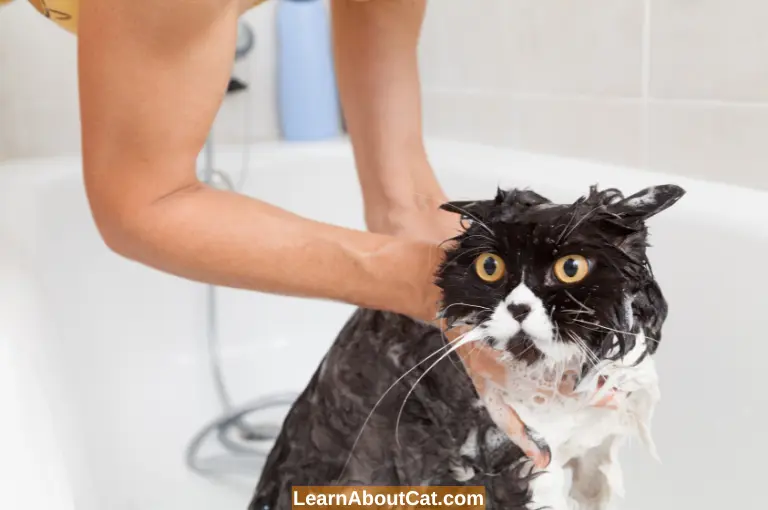
1. Keep an Eye Out for Signs of Illness
You should always be on the lookout for symptoms of skin sensitivity following the use of human shampoo on your cat, especially if your cat’s skin seems excessively dry or flaky.
- Reddened or irritated skin
- Itching or worsening discomfort
- Hair loss that is extreme or unexpected
- Diarrhoea, nausea, or weariness.
If your cat’s skin is only minimally inflamed, you can watch them and wait for their pH and moisture levels to return to normal.
2. Moisturising Cream
If your cat’s skin feels dry after being washed with human shampoo, try moisturising the area to aid in its healing.
Coconut oil is a great choice as it is a natural lubricant and has anti-inflammatory characteristics that may aid in calming and soothing sensitive skin. Additionally, it gives their coat a brilliant gloss! It should only be used occasionally, though, since frequent usage might lead to problems. Using olive oil is an additional choice. This works well for moisturising dry skin but lacks coconut oil’s potent anti-inflammatory effects. Thus, it won’t alleviate discomfort.
3. Take them to the Physician
If your cat is clearly unhappy and exhibiting major signs of inflammation, try moisturising their skin at home straight away. While applying products to skin that is already irritated might make it worse, this approach might work for small irritants. Instead, take your cat to the doctor and seek guidance there.
If your cat exhibits indications of poisoning, such as lethargy, vomiting, or diarrhoea, take them to the veterinarian straight away.
Are There Any Shampoos That Can Be Used on Cats?
Human shampoo is ineligible for cats; however, several fantastic substitutes are safe for your feline friend. Although cat shampoo should always be used and is always the best choice, some DIY alternatives are produced from commonplace products and various materials.
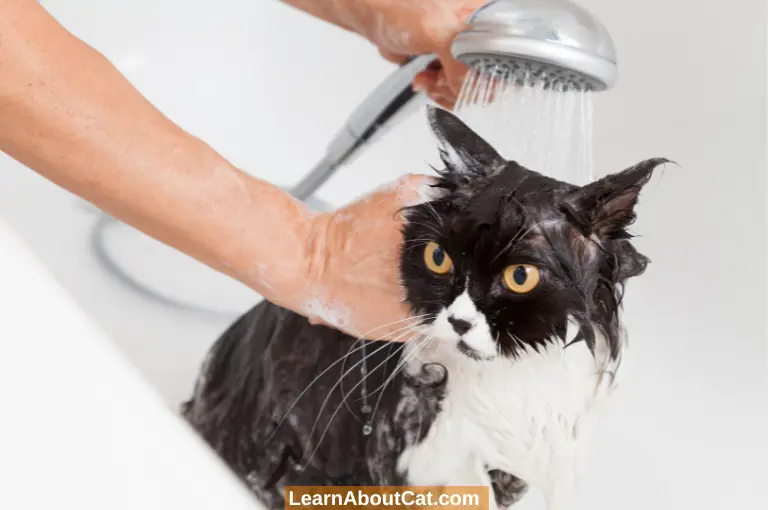
Here is a closer examination of each option.
1. Cat Shampoo
If your cat ever gets stuck, it is best to wash it using cat shampoo. It is safe, non-toxic, and won’t annoy cats because it was created with them in mind and tested on felines. Cat shampoo is available at your neighbourhood zoo.
2. Oatmeal-infused Dry Shampoo
A quick and low-cost DIY alternative for cat shampoo is dry oatmeal shampoo. To make this dry shampoo, combine equal portions of oatmeal and cornflower, one teaspoon of baking soda, and two teaspoons of cornstarch.
While baking soda helps eliminate any remaining odours, oatmeal and maize flour absorb extra oils from your cat’s fur and skin without being unduly harsh.
3. Dishwashing Liquid
A small amount of mild dish soap, like Dawn soap, which is routinely used by animal shelters to help clean stray animals who are brought in, can also be used to clean your cat.
Regular washing-up liquid, which may be harsh and damaging, differs from Dawn soap in several ways. Therefore, it is advised to stick with Dawn rather than take a chance using a dishwashing detergent whose safety is not well known. Dawn soap is generally gentle enough for cats; however, dish soap shouldn’t be used on cats who have chronic skin conditions or inflammation.
4. Baby Shampoo
Since baby shampoo is designed for skin that is more delicate and sensitive, it is a far safer option than regular human shampoo, which is too harsh for cats to use. Newborn skin also has a pH that is more neutral and mimics cat skin when compared to adult skin. Baby shampoo is a much better option for cats as a consequence because it won’t have a negative impact on their skin’s acidity as much.
In addition to having a gentler and less acidic formula, baby shampoo has fewer chemicals, parabens, sulphates, alcohol, and soaps that might irritate the skin. The baby shampoo also keeps skin moisturised, helping keep your cat’s skin from being too dry.
5. Dawn Dish Soap
Most of us have seen firsthand how Dawn dish soap removes oil from animals that have been affected by pollution at animal rescue centres. This implies that your cat will do a fantastic job of washing its coat if it is coated in oily or sticky residue.
6. Castile Soap
Cat shampoo can be successfully replaced with olive oil-based castile soap. It is gentle and naturally moisturising, making it a fantastic choice for cats with dry skin.
7. Cornstarch
If you routinely use cornstarch in your cooking, you already own the perfect alternative to dry cat shampoo! This may be sprinkled over your cat’s coat; you can use your hands to rub it in. After being brushed, your cat will look and smell better.
8. Baby Wipes
You may also try cleaning your cat with baby wipes. If not, most of us have cosmetic or baby wipes in our homes. As long as they are fragrance-free, any of these can be used to assist in cleaning your cat’s fur. Otherwise, they could irritate you.
Despite being created for humans rather than cats, baby wipes are safer since they frequently just make surface contact with the skin instead of rubbing your cat’s skin as shampoo does.
9. Baking Soda
If you only want to clean up your cat’s fur and don’t want to get them wet, baking soda may be a great deodorizer and grime remover. If you don’t know how to bathe a cat correctly, just sprinkle the baking soda over your cat’s coat and keep it away from its face. Work it into the base of the coat, giving it a good massage with your hands. After letting it sit and brushing it out, remove as much as possible with a dry towel.
What Should I Do if My Cat Won’t Groom Itself?
Cats frantically groom themselves, so you shouldn’t have to bathe them very frequently, if at all. What if your cat doesn’t brush itself, and you have to bathe it frequently? Lack of grooming can lead to matted cat fur, which can cause a number of different health problems. Thus, take your cat to the vet as soon as you can. There are several reasons why your cat could not be adequately grooming themselves, some of which include:
- being overweight and finding it challenging to reach some places
- Dental issues that make it painful to self-groom, tight joints, and arthritis-related stiffness
- Stress or anxiety
- A general illness like nausea or vomiting
Frequently Asked Questions
Without using cat shampoo, how should a cat be washed?
You may give your cat a bath without using cat shampoo by employing a number of methods, such as a baby shower, soap, only water, or a dry bath.
Can you use dog shampoo on cats?
You may wonder whether you can use your dog’s shampoo on your cat if you own dogs that you regularly bathe. No, you can not use dog shampoo on cats. Cats are incredibly vulnerable to some of the ingredients found in shampoos made specifically for dogs.
Are cat and dog shampoos the same?
The key difference is formulation: cat shampoos are made for skin pH levels that are more acidic, whereas dog grooming products often include ingredients that are harmful to cats.
What soap can I use to wash my cat?
Castile Soap can be used to wash your cat. You can clean almost anything with it, including your cat, because it is non-toxic, natural, and can be used almost anywhere.
The soap is made from vegetable oils and does not contain harsh chemicals or animal fats. Coconut, castor, and hemp oils are often found in castile soaps.
Final Thoughts!
Human skin is more moisturised and acidic than cat skin, which is why human shampoo was developed specifically for human skin. As a result, it may cause extreme dryness, irritability, and long-term immune system suppression. Cats may find some odours disagreeable, and some chemicals could be dangerous.
Fortunately, there are shampoos designed specifically for cats that have been tested on them and are shown to be both effective and safe. If you’re in a bind, consider using one of the inexpensive DIY cat shampoos I suggested. Remember that human shampoo is the greatest shampoo if you’ve run out of choices and that your veterinarian is always there to help.
Who is Isabella?
My name is Isabella, and I am a dedicated and knowledgeable cat enthusiast. With years of experience caring for cats and a deep love for felines, I made a mission to help other cat lovers navigate the challenges of cat ownership.


